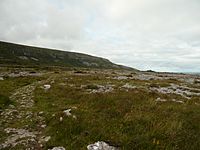Keelhilla, Slieve Carron facts for kids
Keelhilla, Slieve Carron is a special place in County Clare, Ireland. It's a national nature reserve, which means it's a protected area of land. This reserve covers about 360 acres (that's like 270 football fields!). The Irish National Parks & Wildlife Service looks after it, making sure its unique plants and animals are safe.
Contents
Discovering Keelhilla, Slieve Carron
Keelhilla, Slieve Carron became a protected national nature reserve in 1986. It's often called the Slieve Carran Nature Reserve. This amazing area is part of the larger Burren region. The Burren is famous for its unique limestone landscape. Imagine a rocky, almost moon-like surface, but with incredible plants growing in the cracks!
Unique Limestone Landscape
The reserve sits on the edge of the Burren plateau. It has a special type of rocky ground called karst. This means the limestone has been shaped by water over thousands of years. You can see flat limestone pavements, areas with scrubby grass, and even woodlands.
Amazing Plants and Animals
Keelhilla is home to some very important habitats. These include grasslands where beautiful orchids grow, and the famous limestone pavements. You can also find "petrifying springs" here. These springs have minerals that can turn plants into a rock-like substance over time!
The reserve is a great place for wildlife spotting. You might see:
- Choughs - These are shiny black birds with bright red beaks and legs.
- Peregrine falcons - These are super-fast birds of prey.
- Feral goats - A herd of wild goats roams freely here.
Scientists have also found a rare "glue fungus" growing on the hazel trees in Keelhilla. It's a truly unique place for nature lovers!
Ancient History and Walkways
Keelhilla isn't just about nature; it's also full of history! There's an old settlement from the early medieval period linked to a saint named Colman mac Duagh. You can find several ancient sites, including:
- A stone oratory (a small chapel)
- A holy well
- An old graveyard
There are even older sites dating back to the Bronze Age. This shows that people have lived in and used this area for thousands of years. If you visit, there are two special walkways you can follow to explore the reserve.
 | William L. Dawson |
 | W. E. B. Du Bois |
 | Harry Belafonte |


